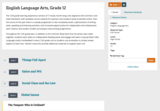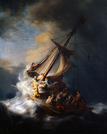
In this lesson, students will write a strong concluding paragraph that summarizes the main ideas of a research essay.
- Subject:
- Arts
- English Language Arts
- Material Type:
- Lesson Plan
- Provider:
- BetterLesson
- Date Added:
- 12/01/2022

In this lesson, students will write a strong concluding paragraph that summarizes the main ideas of a research essay.

This lesson is a great small group reading lesson that has a social studies connection. In this lesson, students will be comparing and contrasting schools from long ago and schools of today using informational texts. Included are printables to make a book and a bubble map. Examples of student work are also provided.

Students will complete a double bubble thinking map by sorting facts that go with Washington, Lincoln or both. Also included in this plan is an art project, worksheets, and video of the lesson in action. Great activity to use after reading about Washington and Lincoln!

Sequencing is an important skill for kindergarten students. This lesson uses nonfiction texts to allow students to make a real-life connection to the skill of sequencing and learn about the plant cycle at the same time! Included are bulletin board ideas, links to videos, a plant cycle poster, and printable worksheets.

This lesson uses the book Explorers of North America - A True Book by Brendan January to teach students how to identify the main topic of a multi-paragraph informational text and specific paragraphs within the text. Students are guided in how to create a timeline of historical events and they learn about text features. The lesson is done using print materials and a whiteboard with markers, but could be adapted to use with an interactive whiteboard. Worksheets, samples of student work, and videos of them discussing their work are provided.

Students will be able to compare and contrast two non-fiction books with a similar theme - in this case, plant life cycles. Extensive resources included such as worksheets, samples of student work, assessment ideas, extension activities, and videos of the lesson in action.

A silly read-aloud captures the attention of students who must jump right into action applying the engineering design process in an effort to stop the squirrels from eating the birdseed. To complete the brainstorming students will work on a journal entry to share the problem and their possible solutions.

Links to 7 lessons and activities that build student skills in standard W.3.2c: Use linking words and phrases (e.g., also, another, and, more, but) to connect ideas within categories of information.

Using the book "Is My Dog a Wolf?" students will find "connections or similarities" in two animals. Included is a printable graphic organizer.

Contains plans for four 50-minute lessons that ask students to use their five senses for poetry prewriting. In addition to student objectives and standards, this instructional plan contains links to PDF handouts and sites used in the lessons as well as assessment and reflection activities.

SCU uses StoryCorps' tested interviewing techniques-combined with outstanding radio broadcasts and animated shorts-to support high school students in the development of identity and in drawing connections between their unique strengths and the college application process.

Different techniques for writing detailed descriptions of an object are found on this page.

In this segment from Curious, learn about creating energy from solar rays to meet the growing energy needs of the world. [6:09]

In this video [4:46] King Friday is visiting Grampy for the day, and Donkey and Panda host the King while Grampy runs an errand. Explore with your class the core message, "I have my own ideas and I can share them." Student materials are provided, and the video is available in English and Spanish.

The 12th grade learning experience consists of 7 mostly month-long units aligned to the Common Core State Standards, with available course material for teachers and students easily accessible online. Over the course of the year there is a steady progression in text complexity levels, sophistication of writing tasks, speaking and listening activities, and increased opportunities for independent and collaborative work. Rubrics and student models accompany many writing assignments.Throughout the 12th grade year, in addition to the Common Read texts that the whole class reads together, students each select an Independent Reading book and engage with peers in group Book Talks. Language study is embedded in every 12th grade unit as students use annotation to closely review aspects of each text. Teacher resources provide additional materials to support each unit.

Who decides who among us is civilized? What rules should govern immigration into the United States? Whom should we let in? Keep out? What should we do about political refugees or children without papers? What if they would be a drain on our economy?
ACCOMPLISHMENTS
Students read William Shakespeare’s play The Tempest and write a short argument about who in the play is truly civilized.
Students participate in a mock trial in which they argue for or against granting asylum to a teenage refugee, and then they write arguments in favor of granting asylum to one refugee and against granting it to another.
Students read an Independent Reading text and write an informational essay about a global issue and how that relates to their book.
GUIDING QUESTIONS
These questions are a guide to stimulate thinking, discussion, and writing on the themes and ideas in the unit. For complete and thoughtful answers and for meaningful discussions, students must use evidence based on careful reading of the texts.
What role do national identity, custom, religion, and other locally held beliefs play in a world increasingly characterized by globalization?
How does Shakespeare’s view of human rights compare with that in the Universal Declaration of Human Rights?
Who is civilized? Who decides what civilization is or how it’s defined?
How do we behave toward and acknowledge those whose culture is different from our own?

In this lesson, students will discuss human rights. They’ll begin asking who in The Tempest is civilized. Students will research what life was like in Shakespeare’s time. Then they’ll read and annotate the Universal Declaration of Human Rights.

This project unit—a multimedia self-portrait published in digital form—is the capstone of your students' high school careers. It is a chance for them to pause and reflect on where they've been, where they're going, and who they are as a person. Students will reflect on what they want others to know about them: what they want their message to be and what types of media they might use to convey that message. Students will have the opportunity to express themselves in many different formats—through writing, of course, but also through other media of their choosing. Students will be able to convey your message through visual art, photography, a graphic novel, audio, poetry, or video—practically any type of media they want!
ACCOMPLISHMENTS
Students will complete a multimedia self-portrait, capturing important aspects of the essence of themselves.
Students will contribute one chapter from their multimedia self-portrait to a class anthology.
Students will present one chapter from their multimedia self-portrait to the class.
GUIDING QUESTIONS
These questions are a guide to stimulate thinking, discussion, and writing on the themes and ideas in the unit. For complete and thoughtful answers and for meaningful discussions, students must use evidence based on careful reading of the texts.
How is late adolescence a moment of internal and external change?
What are the most important qualities of your character—past, present, and future?
How can you portray these key aspects of yourself using multimedia?
BENCHMARK ASSESSMENT: Cold Read
During this unit, on a day of your choosing, we recommend you administer a Cold Read to assess students’ reading comprehension. For this assessment, students read a text they have never seen before and then respond to multiple-choice and constructed-response questions. The assessment is not included in this course materials.

The class will finish the presentations. What new things about the students did the presentations teach them? Were there common themes students noticed in all of the presentations? Did those themes help them draw conclusions about the experience of being a teenager?

This video from Evolution explores the evolution of humans from a common ancestor of humans, chimpanzees, and other apes.